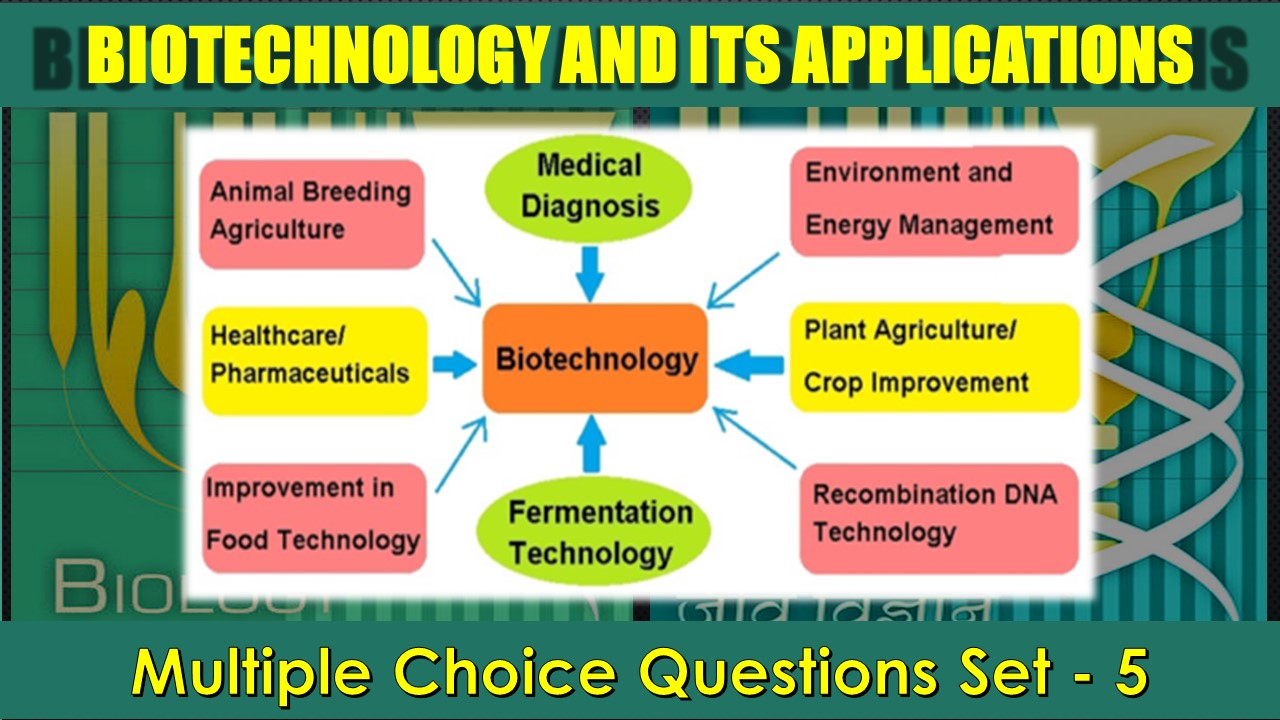CBSE Class 12 Biotechnology and its Applications Multiple Choice Questions with Answers. MCQ Questions Class 12 Biotechnology and its Applications with Answers Is Prepared Based on Latest Exam Pattern. Students can solve NCERT MCQ questions Class 12 Biotechnology and its Applications with Answers to know their preparation level.
Students who are searching for NCERT MCQ Questions Class 12 Biotechnology and its Applications with Answers are compiled here to get good practice on all fundamentals. Know your preparation level on MCQ Questions for Class 12 Biotechnology and its Applications with Answers. You can also verify your answers from the provided MCQ Class 12 Biotechnology and its Applications with Answers. So, ace up your preparation with MCQ of Class 12 Biology Examinations.
MCQ Questions Class 12 Biotechnology and its Applications with Answers - Set - 5
Question 1:
Silencing of mRNA has been used in producing transgenic plants resistant to
(a) boll worms
(b) nematodes
(c) white rusts
(d) bacterial blights
Correct Answer – (B)
Question 2:
Natural genetic engineer is :
(a) Bacillus subtilis
(b) Pseudomonas sp.
(c) Escherichia coli
(d) Agrobacterium tumefaciens
Correct Answer – (A)
Question 3:
Maximum number of existing transgenic animals is of
(a) fish
(b) mice
(c) cow
(d) pig.
Correct Answer – (B)
Question 4:
Which of the following Bt crops is being grown in India by the farmers?
(a) Brinjal
(b) Soybean
(c) Maize
(d) Cotton
Correct Answer – (D)
Question 5:
An improved variety of transgenic basmati rice
(a) does not require chemical fertilizers and growth hormones
(b) gives high yield and is rich in vitamin A
(c) is completely resistant to all insect pests and diseases of paddy
(d) gives high yield but has no characteristic aroma.
Correct Answer – (B)
MCQ Questions Class 12 Biotechnology and its Applications With Answers
Question 6:
Which Vitamin has been transferred to golden rice?
(a) Vit-B12
(b) Vit-A
(c) Vit-D
(d) Vit-C
Correct Answer – (B)
Question 7:
Select the correct statement(s)-
(1) IARI has released a mustard variety rich in vitamin C.
(2) Pusa Sawani variety of Okra is resistant to aphids.
(3) Hairiness of leaves provides resistance to insect pests.
(4) Agriculture accounts for approximately 33% of India’s GDP and employs nearly 62% of the population.
(a) (1) and (2)
(b) (2) and (3)
(c) (1), (3) and (4)
(d) None of these
Correct Answer – (C)
Question 8:
What is antisense technology?
(a) When a piece of RNA that is complementary in sequence is used to stop expression of a specific gene
(b) RNA polymerase producing DNA
(c) A cell displaying a foreign antigen used for synthesis of antigens
(d) Production of somaclonal variants in tissue cultures
Correct Answer – (A)
Question 9:
ELISA is used to detect viruses where the key reagent is
(a) alkaline phosphatase
(b) catalase
(c) DNA probe
(d) RNase.
Correct Answer – (A)
Question 10:
In India, the organisation responsible for assessing the safety of introducing genetically modified organisms for public use is
(a) Indian Council of Medical Research (ICMR)
(b) Council for Scientific and Industrial Research (CSIR)
(c) Research Committee on Genetic Manipulation (RCGM)
(d) Genetic Engineering Appraisal Committee (GEAC)
Correct Answer – (D)
- NCERT Solutions Class 11 Chemistry Chapter 1 : Some Basic Concepts of Chemistry
- NCERT Solutions Class 11 Chemistry Chapter 2 : Structure Of The Atom
- NCERT Solutions Class 11 Chemistry Chapter 3 : Classification of Elements and Periodicity in Properties
- NCERT Solutions Class 11 Chemistry Chapter 4 : Chemical Bonding and Molecular Structure
- NCERT Solutions Class 11 Chemistry Chapter 5 : States of Matter
- NCERT Solutions Class 11 Chemistry Chapter 6 : Thermodynamics
- NCERT Solutions Class 11 Chemistry Chapter 7 : Equilibrium
- NCERT Solutions Class 11 Chemistry Chapter 8 : Redox Reactions
- NCERT Solutions Class 11 Chemistry Chapter 9 : Hydrogen
- NCERT Solutions Class 11 Chemistry Chapter 10 : The s-Block Elements
- NCERT Solutions Class 11 Chemistry Chapter 11 : The p-Block Elements
- NCERT Solutions Class 11 Chemistry Chapter 12 : Organic Chemistry: Some Basic Principles and Techniques
- NCERT Solutions Class 11 Chemistry Chapter 13 : Hydrocarbons
- NCERT Solutions Class 11 Chemistry Chapter 14 : Environmental Chemistry




